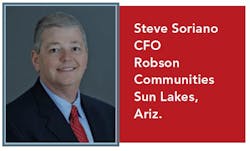Robson's Steve Soriano on adding water, sewer, and rentals to diversify revenue
Having been with the company for 22 years, Steve Soriano—who started as a financial analyst—has witnessed the progression of Robson’s diversification.
Initially, Edward Robson worked for retirement community mogul Del Webb and sold mobile home lots. He struck out on his own and opened Sun Lakes, his first development, in the Chandler, Ariz., area in 1972. Today the 87-year-old builder and developer is founder and chairman of Robson Communities.
Robson, and its affiliated companies, is one of the largest private employers in Arizona, with more than 1,650 employees working at operations that include five resorts for active adults and the Robson Ranch, in Denton, Texas.
Robson’s diverse portfolio includes being one of the biggest private water utilities—Picacho Water Co.—and sewer providers in the Grand Canyon State, in addition to developing and managing commercial properties and shopping malls. Robson also expanded Renaissance, the senior independent living apartment brand it launched during 2000 in Sun Lakes, by adding assisted living and memory care services in 2012. And recently Robson Multi-Family announced plans to build Noria, a luxury apartment community in Chandler.
Q: Some single-family home builders have diversified since the downturn by constructing townhomes or apartment complexes, neither of which is too far afield from the core skills and experience they already possess as home builders. Robson Communities is unique in that it operates utilities as well. How else has the company diversified?
A: Revenue diversity has been a big part of Robson’s secret recipe for 30-plus years. In addition to being a middleweight home builder, we have been one of the larger water, wastewater, and commercial developers in Arizona since the beginning.
Recently, a natural expansion for us was into rental senior living, independent and assisted, in and around our master planned communities. While these are very different businesses from merchant building, they supplement cash flow during inevitable single-family home building dips.
Q: What was the thinking or opportunity behind Robson expanding into assisted living?
A: We found an unmet demand for quality upscale independent and assisted living in Sun Lakes, Ariz. In 2000 there was little competition and the elements were in place for an upscale alternative. Better amenities, bigger apartments, finer finishes, and, yes, higher monthly fees proved to be a recipe for success. And we’re taking the product to our other active adult communities and are having similar success.
Right or wrong, our philosophy has been to develop at the more highly amenitized end of the spectrum and to charge the requisite premium. It’s hard to satisfy the customer and make any money on a “down and dirty” product.
Q: What are the motivations and the objective behind Robson Multi-Family and Noria?
A: Robson’s first Arizona multifamily project in 15 years, Noria at Chandler Airpark, is the result of a lot of positive factors coming together at the same time. Chandler, Ariz., is one of the fastest growing markets for employment, single-family housing, multifamily housing, and rent appreciation.
Noria, a Robson brand, represents a high-water mark for luxury. The apartments are bigger, the appliances, countertops, tile work, and amenities are nicer. There is also a price premium.
Other people have done well by building apartments to sell. The Robson philosophy is to build, hold long-term, and operate. That’s how we justify the incremental investment in better location, design, and construction.
Q: How about the shopping mall?
A: Shopping centers are a less cheerful topic for us. Unless you have a very special location, retail is suffering. The big grocers have done an excellent job of consolidating into supercenters. The large discounters need more land than we can supply. The typical neighborhood centers are being asked to get by on nail salons and dog groomers who simply can’t afford the operating costs of the traditional CAM (Common Area Maintenance) pass through. Someone is going to come up with a brilliant re-use solution for the neighborhood center, and we will be watching.
Q: Any lessons, caveats learned along the way that you can share?
A: Real estate development is not like poker. You don’t bluff. You don’t take chances and you don’t depend on competition folding. Your success is 100 percent based on the strength of your cards, or product execution. Ed Robson could have built the Senior Living many years earlier. He could have built the Noria Apartments many years earlier, but he waited until he had the right conditions with market, location, design, and team to bring the projects from concept to occupancy. He waited until he had the best conditions all working together in synchronicity and then executed.
Q: There are builders that do their own land development, but they let someone else provide the water and sewer service. Why did Robson decide to take on being a utility as well as a builder?
A: Ed Robson was the developer of several rural developments where the original farmer or rancher owned the right to serve the property water and/or sewer. A typical developer might make the decision—or, in our view, the mistake—of ceding that service area right to a third party, either private or public. As the developer in Arizona, you pay for the construction, supply, and initial service capacity for water and wastewater in your community. If you are related to the utility provider, that investment can build equity for you. If you are simply paying impact fees to a city or a utility district, the amount you must pay is similar, but you will never get a return on that investment.
The same goes for advances and contributions in aid of construction to unrelated utilities. You rarely recoup a significant amount of your impact or development fees, much less make a measurable return. But by owning and operating the wet utilities, you eventually get a small but steady return on your investment. It’s slow in coming, but it helps you weather dips in new-home sales with steady cash flow during recessions.
Arizona development is all about the water. Analogous to California master plans being about the EIR [Environmental Impact Report], and Florida requiring a DRI [Development of Regional Impact], you can’t develop a large master planned community in Arizona without a long-term, thought-out, and documented water supply.
Q: Even so, being a utility sounds like unfamiliar territory for a builder.
A: As a master plan developer, you’re called on to fund the construction and initial operating deficit of the utilities, whether the operator is a city, a county, or a private operator. The incremental costs of being an operator are minimal. It isn’t that hard. So long as you approach the task with an emphasis on public service and quality operations, the fundamentals can be learned as you grow.
Ed periodically has a team retreat where we discuss aspects of our business where others are taking a profit from our communities. We discuss whether further integration would be beneficial for the customer. An environmental service such as water and wastewater was an easy decision. We are also in the mortgage, publishing, food and beverage, and assisted living sectors.
Another hidden benefit of owning the utilities is being able to control the treatment level of the effluent coming out of the wastewater plant. We treat effluent to a very high standard that allows re-use on plants and grass. In Arizona, as in most arid states, high quality effluent is used to irrigate the landscape and golf courses. It is cheaper, more efficient and better for the environment.
Q: Is all of this diversification simply about pursuing opportunity, or is it more about weathering the storm during slumps?
A: If you think of yourself as a single industry provider, such as “just a merchant builder” or “just a shopping center developer,” you’re going to get clobbered in the inevitable downturns. Revenue diversity, Ed Robson–style, is the only way to ensure durable, sustained success.

